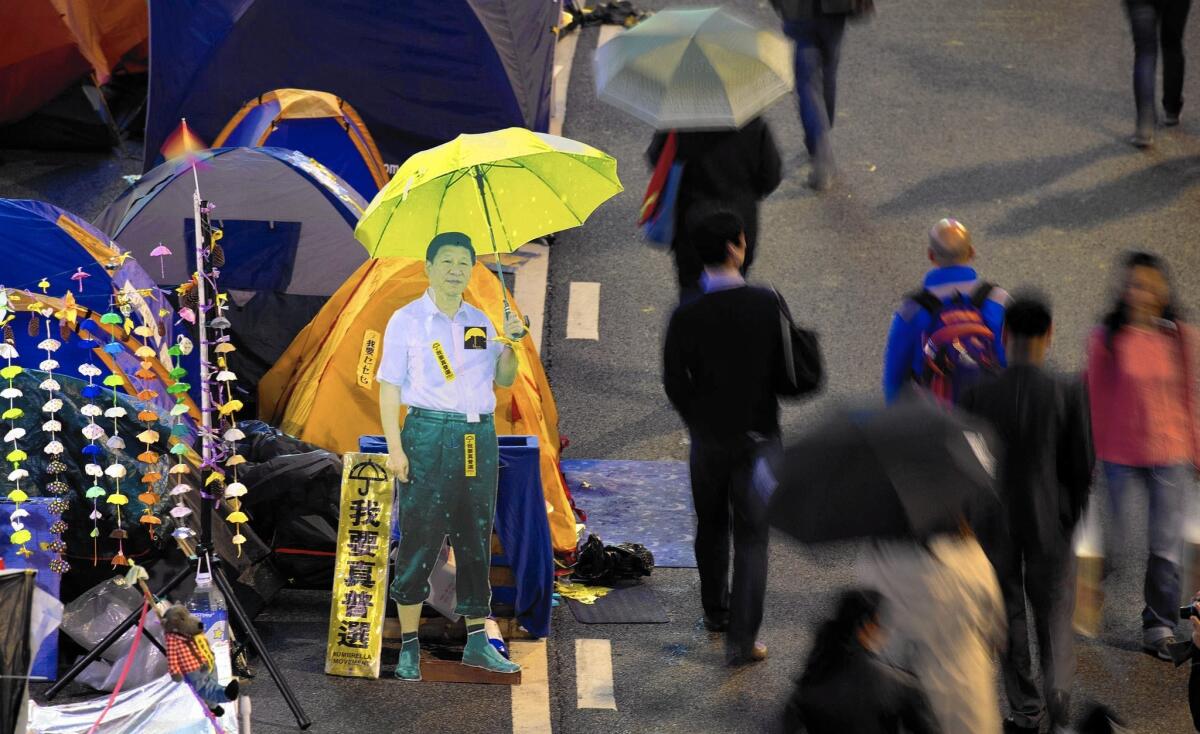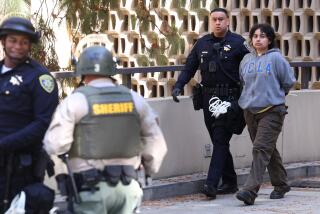Q&A: In Hong Kong, a passionate but mostly peaceful campaign for democracy

A cardboard cutout of Chinese President Xi Jinping carrying a yellow umbrella at the Hong Kong pro-democracy movement’s main protest site in the Admiralty district on Dec. 2.
Reporting from Beijing — When Hong Kong’s democracy street protests erupted in late September, many people in the semiautonomous Chinese territory — and around the world — feared that authorities would respond with a bloody crackdown like they did in Beijing’s Tiananmen Square in 1989. Instead, officials essentially pursued a tactic of waiting the demonstrators out, and on Thursday, the 75th day of the sit-ins, police moved in to remove the last remaining barricades and protesters from the streets.
During the 2½ months, police, pro-democracy protesters and counter-demonstrators clashed periodically, with officers using pepper spray, tear gas and batons. Hundreds of people, including seven officers accused of beating a handcuffed demonstrator, were arrested. Although those incidents stunned some people in the former British colony of 7 million, which has a long history of orderly and decorous marches and rallies, many observers have remarked on the restraint exercised by protesters and authorities.
We asked UC Irvine history professor Jeffrey Wasserstrom, author of “Student Protests in 20th Century China,” to reflect on why the demonstrations were mostly peaceful. Following is an edited and condensed version of the conversation.
Why did Hong Kong authorities and their ultimate Communist Party masters in Beijing take this approach?
The thing that would have scared the Chinese Communist Party the most is if there had been sympathy protests on the mainland. While there was this waiting game in Hong Kong, they didn’t wait around when it came to anything that would flow into the mainland. People there who expressed any kind of sympathy were arrested quite quickly. There was also measures like the blocking of Instagram.
That fits with the general pattern: The party is less worried about things that stay localized to one social group or to one part of the country. That’s often forgotten, because the media memory about 1989 is about Beijing events only. But one of the reasons China’s government was so concerned about that was it was actually 100 cities or more that had significant sized protests in 1989. We would have had a very different reaction this year if there had been protests across the border in the mainland city of Shenzhen at the same time there were protests in Hong Kong.
The surprising thing in 1989 wasn’t that there was a crackdown; the surprising thing was it took so long until there was one. Protesters were on the streets for weeks. People then were saying, ‘since this is going on so long, even though we expected there to be harsh measures used, maybe there won’t be.’
So in that way, as wrongheaded as too much of the Tiananmen analogy was to this year’s Hong Kong protests, if you want to look at what was surprising in 1989 and again surprising here, it was how long things went on.
Why didn’t we see sympathy protests on the mainland?
For there to be sympathy protests, the biggest thing you need is for people to feel that the demonstrators on the streets are just like them; they need to think, “That could be my friend, my brother, my sister.” But even if people on the mainland, in an abstract way, want more freedoms, most didn’t relate to the movement.
What the Hong Kong student protesters worry about, and what drove them to the streets in part, is the feeling that the difference between their lifestyle and the mainland was shrinking; the things that make Hong Kong special are in danger. But in a lot of stages of the protest, we had reminders of how different life still is in Hong Kong, for example, how freely the press covered events.
Another thing that really stood out to me was after some students were arrested very early on, the courts moved in to get them released. That’s something that I’ve just never heard of happening on the mainland.
Do you think one of the major take-aways for Chinese authorities is that censorship worked, that it helped prevent protests on the mainland?
The Chinese government uses very different kinds of censorship for things that reach different segments of the population. There’s a segment of the population now who travel abroad or have relatives traveling abroad; you’re not going to stop the most educated, articulate, cosmopolitan, curious people from getting a sense of what’s going on in the wider world.
But they didn’t want ordinary people exposed to really dramatic photos that contradicted the government’s position. They didn’t want people to see streaming video or television reports on that.
I think the government’s attitude vis-a-vis the media is something we’ve seen before: They initially really try to block information, then put energy into spinning and controlling the story. They might think that worked relatively well; they managed to talk constantly about the disruption and instability and futility of the Hong Kong protests: These are rowdy protests, and they can’t succeed. This was a theme they had early on in the official press, and that story worked for them to some extent.
How might things have turned out differently?
I think things would have wound down much sooner if police had not used tear gas on the first weekend of demonstrations. On the other hand, if there had been a death, there might have been sympathy protests on the mainland. If police had killed a young student, there might not have been massive protests but that could have tipped things. The power of martyrdom to ramp up protests is really significant.
There was extensive discussion about the politeness and organization of the protesters. Did this surprise you?
I was struck by that personally as well. There were signs in the protest zone saying, ‘Please don’t take photos of the students, as this can cause anxiety; we’re sorry for the inconvenience.’
Similar things have been said about protests in Taiwan, and some events in the Chinese past as well. There was discussion during Tiananmen about how organized things were, and how even pickpockets were taking the days off. In the Republican-era protests in early 20th century, when students went on strike, they would put out guidelines about how they shouldn’t view this as a break from studies, they should look at it as a time to further their education through political action, they should set aside time to read and to engage in self-cultivation.
So even though some of the Hong Kong protesters don’t identify so much with China, and think of themselves as “Hong Kongers,” this idea of presenting yourself in the traditional scholar intellectual mode even when you’re on the streets, that fits with Chinese tradition. That’s really different from the U.S. where participants in youth movements don’t say, ‘think of us as intellectuals.’ It’s very different from the kind of Woodstock-type movements we’ve had.
A lot of Hong Kong protesters are now looking to the example of Taiwan’s democracy and its Sunflower Movement as they think about their next steps. Meanwhile, people in Taiwan — which mainland leaders regard as a breakaway island and want to reunify with under a semiautonomous framework like Hong Kong now has — are eyeing events in Hong Kong warily.
How might the Hong Kong protests have repercussions beyond Hong Kong?
Stepping back, I do think the link between the Taiwan story and the Hong Kong story is very significant; 2014 could be remembered as a year where things didn’t go in the direction that Beijing wanted in what they like to think of as “the periphery of greater China.” Things have been troubled in the western Chinese province of Xinjiang, the Taiwan elections didn’t go the way they wanted, and Hong Kong, they didn’t want to have to deal with this.
There’s no real connection between Xinjiang and the other two cases, but I do think people at least in Hong Kong and Taiwan are quite aware of what’s going on in the other place and are looking for signals as to what sort of government is in control in Beijing. One of the many things that put a check on how much repression was used in Hong Kong was the Chinese government knowing that images of the People’s Liberation Army carrying out violence in Hong Kong would have been seen as tremendously significant in Taiwan by people who are on the fence about closer ties with the mainland.
Beyond that, dead bodies in Hong Kong would have messed up things around the world, undoing a lot of that very careful soft power work that things like the 2008 Beijing Olympics were designed to do.
Twitter: @JulieMakLAT
More to Read
Sign up for Essential California
The most important California stories and recommendations in your inbox every morning.
You may occasionally receive promotional content from the Los Angeles Times.











